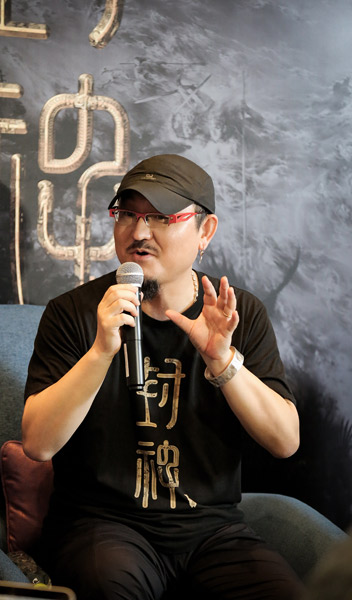
From the People's Daily app.
And this is Story in the Story.
Director Wuershan’s “Fengshen Trilogy” is arguably the biggest cinema undertaking in the history of Chinese film.
With a big budget and a crew of more 2,000, Wuershan has spent a decade adapting the mythological epic.
The story, adapted from the Ming Dynasty (1368-1644) novel “Fengshen Yanyi” (Creation of the Gods), is a mythical war story dating back 3,000 years.
Authenticity is of utmost concern for the director, as some 800 carpenters from Shexian County in Anhui Province and Dongyang in Zhejiang Province were enlisted to make wooden sculptures for the film’s lavish palaces.
The main royal palace, which took 35,000 hours to design and build, has over than 3,000 oil lamps. At least 40,000 props, including weapons, costumes, carriages, and vessels will also be used for the project.
Today’s Story in the Story looks at how one filmmaker is embarking on a cinematic journey to bring an ancient Chinese story to the big screen.

At least 40,000 pieces of props, including weapons, costumes, carriages and vessels are being made for the film project. (Photo: China Daily)
"The Chinese film market has reached a phase and scale with which we can produce grand works that showcase the country's rich legacies in history and culture," said 47-year-old director Wuershan.
Fascinated by the novel since childhood, the filmmaker, who was born in the Inner Mongolia autonomous region, announced the project's launch in 2012.
Wuershan is one of China's best fantasy film directors, exemplified by the blockbusters “Painted Skin: The Resurrection” and “Mojin: The Lost Legend.”
"I have selected the most important work from my perspective, and I expect to spend 10 years on the film project," he explained.
He chose production house Beijing Culture to help make the film.
Du Yang, vice-president of Beijing Culture, said the cast consists of A-list stars, veteran actors, and young people.
The trilogy, which is now being shot in the coastal city of Qingdao, Shandong Province, is scheduled to be released over the course of three years. The first part of the trilogy will be released in 2020.
From 2016 to 2017, the trilogy project launched a campaign to shortlist 30 young people from more than 15,000 aspirants. Of the winners, 16 were selected to join the cast, with six major characters.
The youngsters on the project trained for six months, studying Chinese history, culture, ancient etiquette, and horse riding.
The trilogy marks the acting debut of a woman who plays Su Daji, a vixen spirit embodying a beautiful woman who bewitches King Zhou, hastening his fall, in the novel.
Wuershan said he has asked her to research on foxes to prepare for her role.

Director Wuershan says he is spending a decade on a film project that will adapt the Ming Dynasty (1368-1644) novel Fengshen Yanyi into a trilogy. (Photo: China Daily)
The producers of the Fengshen Trilogy acquired more than 30 horses from abroad including Germany, the Netherlands, and Hungary, and have kept them on a ranch in Qingdao.
The younger actors who play warriors and princes trained to shoot arrows from horseback.
No stand-ins are being used for such roles.
"Previously, most of the cast members that I worked with were big stars. This project also marks my first time working with newcomers on a large scale," Wuershan explained.
"I am too stressed to fall asleep each night before the day when a youngster begins to shoot for his or her first sequence. Fortunately, they are all living up to my expectations, " he said.
Barrie M. Osborne, the trilogy's production consultant, produced “The Lord of the Rings” franchise.
Osborne's experience during the shooting of the Peter Jackson epic trilogy will help Fengshen's production process, during which the three films are being shot simultaneously.
Movie sequels in China are usually made after watching how the first installment performs at the box office.
Wuershan feels that Chinese culture features an enduring history and emphasized, “I wish that such legacies are not only displayed in museums or seen in some foreign films featuring a few Chinatown-set scenes but showcased in an epic which can go abroad."
More than anything, the director wants to connect audiences of different ages with this film and added, "The novel has values that could be passed down from generations.”
(Produced by Nancy Yan Xu, Lance Crayon, Brian Lowe, and Chelle Wenqian Zeng. Music by: bensound.com. Text from China Daily.)


